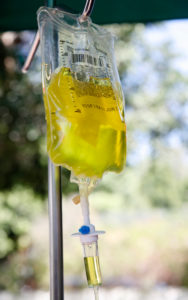Vitamin C and Traditional Chemotherapy
Author: Annette Chlumsky, RN
Originally Published: March 2016, Health Hunters Vol 30 No 4
 Does nutritional therapy reduce the effectiveness of chemotherapy or radiation treatments? That question looms large over our patients that come to Riordan Clinic. Patrick Quillan, author of, “Beating Cancer with Nutrition” recognizes this debate and says cancer patients often feel like a child in a wicked divorce custody battle. The oncologist tells the patient, “Oh, no, don’t take any vitamins because it will decrease the effectiveness of treatment.” The nutritionist may tell the patient, “Don’t take that poisonous chemotherapy/radiation,” or the patient may have those feelings themselves and are torn as to what direction they want to go. In a perfect world, the oncologist and the nutritionist would work together to help the patient, and the patient would greatly benefit from their collaboration.
Does nutritional therapy reduce the effectiveness of chemotherapy or radiation treatments? That question looms large over our patients that come to Riordan Clinic. Patrick Quillan, author of, “Beating Cancer with Nutrition” recognizes this debate and says cancer patients often feel like a child in a wicked divorce custody battle. The oncologist tells the patient, “Oh, no, don’t take any vitamins because it will decrease the effectiveness of treatment.” The nutritionist may tell the patient, “Don’t take that poisonous chemotherapy/radiation,” or the patient may have those feelings themselves and are torn as to what direction they want to go. In a perfect world, the oncologist and the nutritionist would work together to help the patient, and the patient would greatly benefit from their collaboration.
Several research reviews show nutrition may help, but never hinder chemotherapy and radiation treatments. This is best summarized by saying antioxidant nutrients are best absorbed by aerobic (healthy) cells and poorly absorbed by anaerobic (sick, cancerous) cells. Antioxidants protect healthy cells, but not cancerous cells from prooxidative therapies, such as chemotherapy and radiation. If the healthy cells are protected, then the chemotherapy and radiation therapy can be more of a selective toxin against the cancer cells and not a general toxin to the patient.
A study cited in the Journal of Clinical Oncology provides evidence that the glutathione helps prevent Cisplatin (a chemotherapy drug) induced neuropathy and it does not reduce the effectiveness of the chemotherapy drug. In another study, Vitamin E also was shown to reduce neurotoxicity from Cisplatin and protect the heart from damage while taking Adriamycin.
Other antioxidants, such as fish oil, Vitamin A and Beta-Carotene, and Vitamin C act synergistically with chemotherapy and radiation. Vitamin C is one of the safest and least toxic therapies that can be administered to a patient, regardless of the diagnosis. Very large doses orally and intravenously have been given for extended periods of time with no significant problems occurring. There are few, if any, prescription, non-prescription medicines or supplements that are as free of side effects as vitamin C. If high doses are not titrated up gradually, the oral Vitamin C can cause gas, stomach irritation, and diarrhea. This is actually seen more often in “well” patients and appears only rarely in the “very sick” patients who have a very high need for it. Intravenous Vitamin C also needs to be given in graduated doses until achieving the high dose range.
We have had numerous testimonials; from patients coming in for their intravenous Vitamin C infusions that tell us that they would never have made it through the chemotherapy regimen as easily without the support of the Vitamin C infusions. The infusions seem to help them maintain their energy level and sense of well-being; in some cases help relieve pain. The nursing staff has witnessed Vitamin C to be a significant factor in maintaining and restoring health.
If a patient decides to use nutrition in conjunction with traditional medicine therapies, they can share their plan with their oncologist and ask for his cooperation and partnership. Patients who use nutritional supplementation for cancer therapy should always be supervised by knowledgeable medical personnel for their own safety and best results.
References: Beating Cancer With Nutrition by Patrick Quillan, PHD, RD, CNS and Vitamin C, Infectious Diseases, and Toxins by Thomas Levy, MD, JD.





